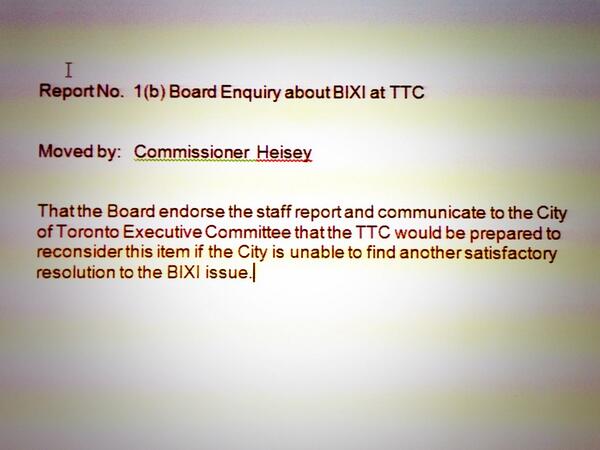nfitz
Superstar
A bit of shift by TTC at their meeting today ... they've rejected it, but left the door open if the city doesn't have another alternative:



I'm very disappointed with their evaluation of it. There was no consideration to changing Bixi's business model to better fit in with what TTC currently does; just complaints that they do not currently align.
TTC buses are most heavily used within 3km of the subway station. This is their peak point and any trips you can divert off a bus (fairly expensive) onto another mode for busy routes is going to have significant financial benefits.
For example, if you diverted 100 trips/hour off peak-hour buses on Finch West and Finch East within 3km of Finch station, that is 4 fewer buses that are needed during rush hour.
[...]
Rather than a blanket of Bixi stations, set it up as an alternative to the short-trips on busy bus routes where TTC currently struggles to add capacity. Accept transfers and charge a standard fare.
I'm very disappointed with their evaluation of it. There was no consideration to changing Bixi's business model to better fit in with what TTC currently does; just complaints that they do not currently align.
Change Bixi to charge a standard TTC fare (tokens, Metropass, cash, Presto), and allow transfers to other TTC vehicles. There is no revenue lost but expenses should have been reduced. It only takes 1 person and 1 vehicle to redistribute the bikes and the capital for a single subway station (say 24 bike locations) is about 1.2Million.
That's quite a change.
I was under the impression most Bixi trips are by subscribers and under 30mins, so free. Why would they want to pay subway fare for what they get for free? My experience in London was that very few of the riders on their bixi system transferred to or from the tube.
They don't want it to change; they're heavily subsidized at the moment which is why TTC doesn't want it. Today Bixi takes fares away from TTC and requires a hefty per-trip subsidy to do that.
Hence, my disappointment that TTC didn't propose an alternative business model which does work for them and may have preserved some of what Bixi is today.
That doesn't mean council has to follow through with it; but I would have liked to have known what the alternative is to shutting Bixi down which is the most likely outcome at this time.
Bixi needs some celebrity endorsers. Seen in NYC, for example, Leonardo DiCaprio riding a Citi Bike:
http://www.huffingtonpost.com/2013/07/02/celebrities-on-citi-bikes_n_3535704.html
Beyoncé likes bike riding, too.
http://www.theatlanticcities.com/commute/2013/08/beyonce-bike-commuter/6453/
Looks like BIXI will finally see an expansion after Kristyn Wong-Tam contributed $1 million from section 37 funds in her ward to BIXI expansion across the city. Since section 37 funds need to be used in the areas where they are collected, she will have BIXI stations in her ward relocated to other parts of the city, and have BIXI reinstall new stations in her ward.
The $1 million should allow for 20 more stations, to add to the 80 that currently exist in the city.
Kudos to KWT for making this happen and finding a way to work around the rules!
http://www.thestar.com/news/city_ha...1_million_to_toronto_bikeshare_expansion.html
I'd like to see half of those stations added to the existing service area: even where I work, University and Dundas area, there should be one or two more to deal with demand (inability to end trip due to full stations in the morning and empty stations in the afternoons). The rest should fill in the gaps on the edge of the system and perhaps start to go right to and a few blocks west of Bathurst (on King, College, Dundas and Harbord): I'm still upset about the removal of the station at Bathurst/Lennox - the next closest Bixi stations are several blocks away.




